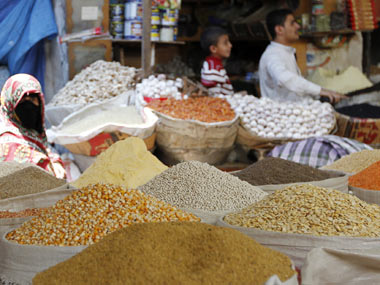The Congress gloats over the Food Security Act as the new welfare marvel ahead of the parliamentary elections, but what it doesn’t tell the people of India is that the acy is under threat from its rich friends.
The government also doesn’t tell the country if it will fight with its friends in the interest of its people.
The threat to India’s food security comes primarily from the US and the EU, who see it as subsidy exceeding what is permitted under the WTO (World Trade Organisation) rules. The WTO Agreement on Agricultural (AoA) subsidies allows only 10 percent (of production) subsidy for most developing countries. Rich countries argue that the Food Security Act exceeds this 10 percent and will therefore “distort” trade.
[caption id=“attachment_1248165” align=“alignleft” width=“380”]  The food bill is under threat: Reuters[/caption]
For the US and the EU, it doesn’t matter that they dish out billions of dollars to protect their agricultural interests, because it is done in the form of food stamps and other cash incentives that come under a convenient “green box” category whereas a guileless India’s food security act looks like a direct subsidy. The “green box” excludes price-support, which is the mainstay of India’s ongoing food programmes.
The result of this skewed arrangement is that countries such as India, whose Food Security Act doesn’t exceed US $20 billion, is seen as “distorting trade” while countries such as the US give away US $100 billion without any problem. (2012 figures)
The double-standards of these rich countries are not surprising because they have to protect their trade interests. But India’s lack of transparency on the issue before its public as well as its lack of resolve to fight the US and EU are indeed surprising. The government, particularly the prime minister and the commerce minister, haven’t yet informed the country what exactly is the state-of-play on the issue.
The country needs to know if they have a game plan and if they will succeed.
Will they work with other developing countries to demolish the devious subsidy system of the US, EU and others, while sticking to their stand irrespective of the consequences such as threats of being dragged into dispute settlement?
Impact Shorts
More ShortsSome media reports quoted a cabinet note which apparently said that India was indeed going to fight for its rights, but officially, the government is still keeping quiet.
The present alarm arises out of an interim text on a G33 food security proposal that will be considered at the Bali ministerial conference of the WTO in early December. The G33, which includes India, made submissions and suggestions on various options for protecting the farm livelihood and food security requirements of their populations.
These proposals were made seven years ago and included the acquisition of food stocks by developing countries with a clear aim of protecting food security initiatives from the ambit of subsidies. The G33 proposals also raise the fact that even the grossly disfavouring 10 percent subsidy limit was calculated on the basis of a fixed reference price of 1986-88, when prices were substantially lower.
At the moment, the only concession being discussed at the WTO is a “Peace Clause (PC)” for a period of four years. In strict terms, it will allow the food programme to be run only for a period of four years, beyond which India can be taken to dispute settlement. Experts warn that even this clause is replete with conditionalities that make it unusable and meaningless.
For instance, the Anti-Circumvention/Safeguard clause stipulates that counties that use this clause “shall ensure that stocks procured under such programs do not distort trade”. This is fundamentally against India’s system of minimum support prices and direct procurement that sustain both its PDS as well as farming.
In a letter to Manmohan Singh, 15 leading farmers’ organisations across the country demanded that India:
• Should stand up to the might of the US/EU, and reject any proposal that leads to dismantling of the famine-avoidance strategies; India cannot be forced to go back to the days of ‘ship-to-mouth’ existence.
• Pursue the G 33 proposal aggressively as the way forward and not accept the current proposal which effectively neutralises the Peace Clause with its farcical conditionalities.
• Challenge the developed countries’ domestic and export subsidies, especially the Green Box. Since 80 per cent of the agricultural subsidises go to the corporates, India must demand withdrawal of subsidy support that goes for corporations.
• Should not trade-off its food security concerns and the livelihood security of millions of farmers against the trade facilitation agreement. The latter is unfair, biased and forwards only a developed country agenda as it stands at the moment.
But we haven’t heard anything from Manmohan Singh or commerce minister Anand Sharma so far.
The lack of transparency on what happens at the trade negotiations front is increasingly inimical to the interests of average Indians. The government has not been forthcoming on the threats the country’s food programme, let alone the new food security act, is facing at the WTO. Similar secrecy also shrouded India’s FTA negotiations with the EU despite protests from various informed quarters that the treaty is against the interst of the country.


)

)
)
)
)
)
)
)
)



